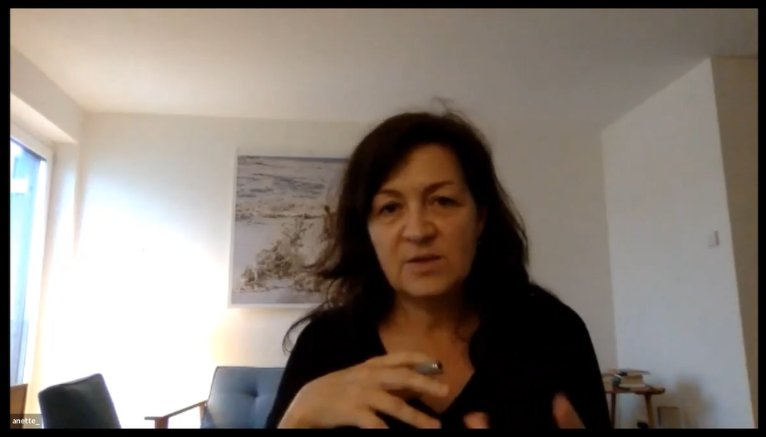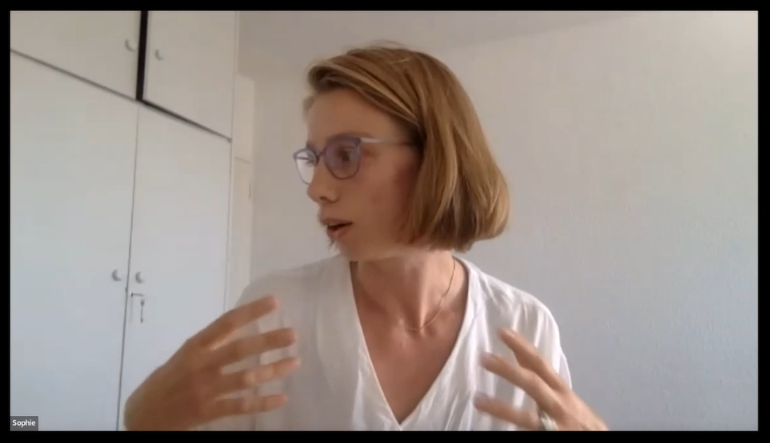Collecting Languages - 17 December 2021

For the last Spirals talk we hosted Dr Anette Hoffmann, whose presentation was titled, “Reading a History of Violence in Linguistic Records”. We engaged with Dorothea Bleek's notebooks from the prison in Windhoek and from a police station in Sandfontein 1920-1922 (available to view on the CCA’s Digital Bleek and Lloyd cover to cover). This session reviewed how their texts present historical articulations of concepts of language, origins, and race, and asked the question: how can we read the example sentences and the transcriptions of accounts of the speakers, who witnessed those practices and responded to them? The recent workshop, “Colonial Collection in Berlin Universities,” (April 2021), offers valuable insight centering from CARMAH which was the major counterpart to the Spirals series. View the discussion from the workshop, “Accessing Colonial Sound Archives,” here, and listen to the Archive for the Eleventh Hour on the Humboldt Forum’s Decolonial Hacker, “In Between Silence and Noise,” (December 2021). Our discussant for this final session, Dr Sophie Schasiepen’s research, revolves around the meaning of human remains that were appropriated for racial science and which are still kept in museum and academic collections for today's politics and demands for social and economic justice
Further reading:
Hoffman, A. (2020). Listening to Colonial History. Echoes of Coercive Knowledge Production in Historical Sound Recordings from Southern Africa. Basler Afrika Bibliographien. [English version: 2022].
Hoffman, A. (2020). Close Listening: Approaches to Research on Colonial Sound Archives. In Bull, M. & Cobussen, M. (Eds.). The Bloomsbury Handbook on Sonic Methodologies. Bloomsbury Academic, New York. 529-542.
Hoffman, A. (2020). War and Grammar. Acoustic Recordings with African Prisoners of the First World War (1915- 1918)”. In Deumert, A., Sheperd, N., & Storch, A. (Eds.). Colonial Linguistics. Oxford, Oxford Academic. 105-128.
Hoffman, A. (2015). Introduction: listening to sound archives. A Journal of African Studies, 41(1). 73-83.
Lange, B. and Gingrich, A. (2014). Captive Voices, Interned Bodies: Rudolf Poch, the Wunsdorf Journey 1917 and the Question of Ethnology. Anthropos: International Review of Anthropology and Linguistics, 109(2). 599-612.
Odumosu, T. (2020). The Crying Child: On Colonial Archives, Digitization, andEthics of Care in the Cultural Commons. Current Anthropology, 61(22). 289-302.
Schasiepen, H.S.C. (2021). Southern African human remains as property: Physical anthropology and the production of racial capital in Austria. [Published doctoral dissertation, University of the Western Cape].
Vallier, J. (2010). Sound Archiving Close to Home: Why Community Partnerships Matter. Notes, 67(1). 39-49.
Zarza Canova, A. (2021). The rhythm of the archive. The Contemporary Journal, 3.
Speaker Bio: Dr Anette Hoffmann studies the collections of linguists with regard to their epistemic practices. She is an associate researcher at the Archives for Public Research and Culture Initiative at the University of Cape Town, currently based at the Institute for African Studies at the University of Cologne, Germany. Her new project engages with historical articulations of language and race in the research of German linguists in Southern Africa. Her monograph “Kolonialgeschichte Hören” was published in 2020, with an English translation scheduled for 2022 (Basler Afrika Bibliographien). Building on her research on recordings with
African Prisoners of World War I in Germany, she curated the exhibition “War and Grammar” (Der Krieg und die Grammatik) shown at the MARKK Museum in Hamburg in 2019. Her sound installation “Foreign Subjects” was shown at the Bergen Assembly in Norway in 2019.
Discussant Bio: Dr Sophie Schasiepen is a postdoctoral researcher for Action for Restitution to Africa, in the Department of History at the University of the Western Cape.
For the last Spirals series session of the year, we hosted Dr Anette Hoffman, an associate researcher at the Archive and Public Culture Research Initiative at the University of Cape Town, currently based at the Institute for African Studies at the University of Cologne, Germany. Hoffman’s research engages with historical articulations of language and race in the research of German linguists in Southern Africa. Her presentation titled, Reading a History of Violence in Linguistic Records, focused on Dorothea Bleek's notebooks covering the period 1920-1922 when she interviewed individuals held at the prison in Windhoek and a police station in Sandfontein.

Hoffman argues that languages cannot be “collected” and that any attempt to do so is yet another form of what the theorist Aimé Césaire (1955) has called ‘thingification’ – the objectification of the colonized subject, which extends to human remains and languages alike. In order to provide evidence for the epistemic violence of the project of colonial linguistics, she focuses, among other sources, on the notebooks of the linguist, Dorothea Bleek.
Engaging with Dorothea Bleeks records as traces of spoken texts, Hoffman, who has worked extensively with sound archives, admitted that audio archives offer richer affordances by means of much less mediated textual material than Bleek’s notebooks. Nevertheless, Hoffman has also begun to formulate certain strategies for a reading of linguistic specimens as fragmented narratives, with recurring themes. Examples for these reccurring tropes are accounts that address the results of the appearance and settlement of white people in the regions where the speakers lived.

At its core, Hoffman’s presentation emphasised the immensity of the anarchive—to quote former CCA doctoral researcher Carine Zaayman—and compounded it through an emphasis on translation, which is itself an act that inevitably results in loss. Her research is ongoing and we look forward to hearing more about this project in the future!